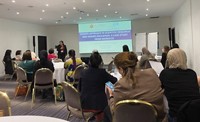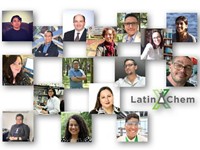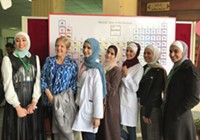Advertisement
Grab your lab coat. Let's get started
Welcome!
Welcome!
Create an account below to get 6 C&EN articles per month, receive newsletters and more - all free.
It seems this is your first time logging in online. Please enter the following information to continue.
As an ACS member you automatically get access to this site. All we need is few more details to create your reading experience.
Not you? Sign in with a different account.
Not you? Sign in with a different account.
ERROR 1
ERROR 1
ERROR 2
ERROR 2
ERROR 2
ERROR 2
ERROR 2
Password and Confirm password must match.
If you have an ACS member number, please enter it here so we can link this account to your membership. (optional)
ERROR 2
ACS values your privacy. By submitting your information, you are gaining access to C&EN and subscribing to our weekly newsletter. We use the information you provide to make your reading experience better, and we will never sell your data to third party members.
Careers
Atlantic Basin Conference on Chemistry hosts inaugural meeting
Attendees say the intimacy of the conference has helped catalyze new collaborations
by Linda Wang
March 12, 2018
| A version of this story appeared in
Volume 96, Issue 11

For a small conference, the inaugural Atlantic Basin Conference on Chemistry(ABCChem) delivered on a big promise: to give scientists from around the Atlantic basin region an opportunity to showcase their research and to help them build collaborations with other scientists from the region.
The meeting, which took place Jan. 23–26 in Cancun, Mexico, was sponsored by the American Chemical Society, the Brazilian Chemical Society, the Canadian Society for Chemistry, the Mexican Chemical Society(SQM), and the European Association for Chemical & Molecular Sciences (EuCheMS). Participating societies included the Federation of African Societies of Chemistry (FASC), the South African Chemical Institute (SACI), and the Federation of Latin American Associations of Chemistry (FLAQ). The meeting was organized around four themes: Chemistry in Biology, Green Chemistry, Materials & Nano Chemistry, and Physical & Analytical Chemistry.
“The practice of chemistry is increasingly global, and there’s great science being done in all parts of the world,” says ACS Executive Director and CEO Thomas Connelly “It’s nice to bring together this particular grouping of chemical scientists.”
In total, 240 people from 22 countries participated in the conference, and nearly half the attendees were students. More than 200 papers on multidisciplinary topics were presented, including 107 oral presentations and 98 poster presentations.
Attendees say the intimate nature of the conference helped catalyze new collaborations and sparked new ideas.
Yadira I. Vega-Cantú, a chemistry professor at Monterrey Institute of Technology & Higher Education in Mexico, brought 11 of her undergraduate students to the conference, and many of them found collaborators in other countries. “My student was presenting his results on reactions in supercritical CO2, and a researcher from France asked if he could buy one of our reactors,” she says, adding that they are now looking into the possibility of commercializing the reactor, which is something they had not considered before the conference.
Galo Soler-Illia, a chemistry professor at the National University of San Martín in Argentina, says the conference offered him a glimpse of the research being done in neighboring countries. He gave a talk on nanomaterials with complex architectures. “We are aware of work in Europe and the U.S., but we are not so aware of the excellent work in Brazil or Canada or Mexico,” he says. “This meeting made me understand that we have a community that we can build.”
The conference also gave attendees an opportunity to learn more about the sponsoring societies. “I shared a table with the president of the Brazilian Chemical Society,” Illia says. “He immediately invited me to their meeting in May and we began to discuss common problems and how to make ties between the Brazilian chemical society and the Argentine chemical societies.”
Other students say the meeting helped broaden their global perspective on science. “As Costa Rica is a small country, I need connections to improve my understanding of science in the world,” says Juan José Montero Hernández, an undergraduate chemistry major from the University of Costa Rica. “I returned to my country with even more desire to continue my career and achieve goals that I had never considered.”
Adam Cooper, an undergraduate chemistry major at Stetson University who wants to pursue a career in international development, says he liked that many of the talks were focused on applications. “The general theme of the conference was focused on green chemistry and international development chemistry,” says Cooper, who presented a talk on the development of a low-cost, sustainable analytical device for the detection of counterfeit pharmaceuticals. “I absolutely loved the conference. It matched really well with my research interests.” ACS past-president Diane Grob Schmidt says she hopes the momentum of the conference continues. “There was a clear belief among the societies that the intimacy and global character of this ABCChem made it special and that a conference like this should have a place in the scientific conference calendar,” she adds.
Details about the next ABCChem will be available later this year.





Join the conversation
Contact the reporter
Submit a Letter to the Editor for publication
Engage with us on Twitter